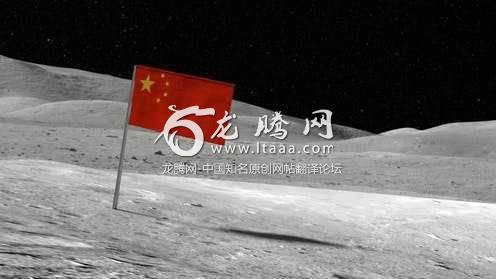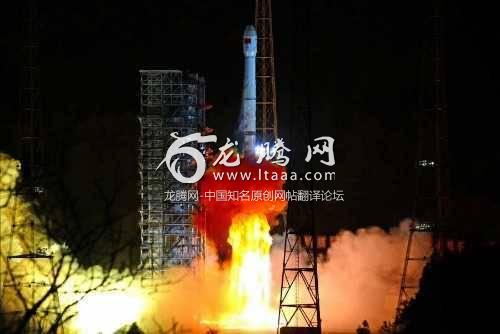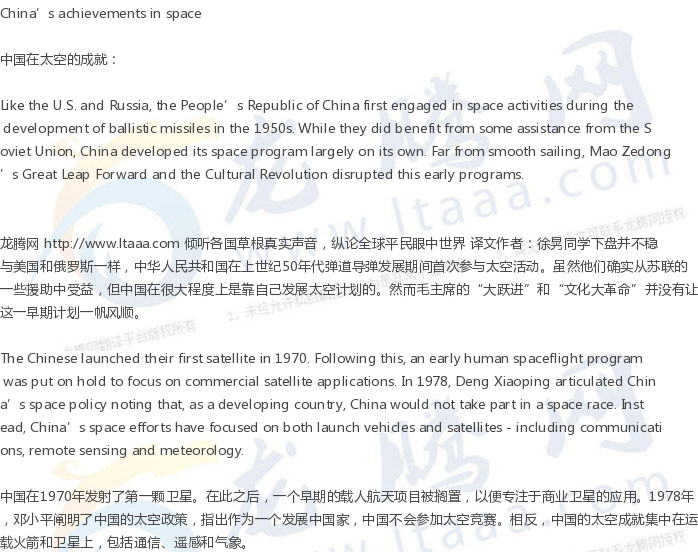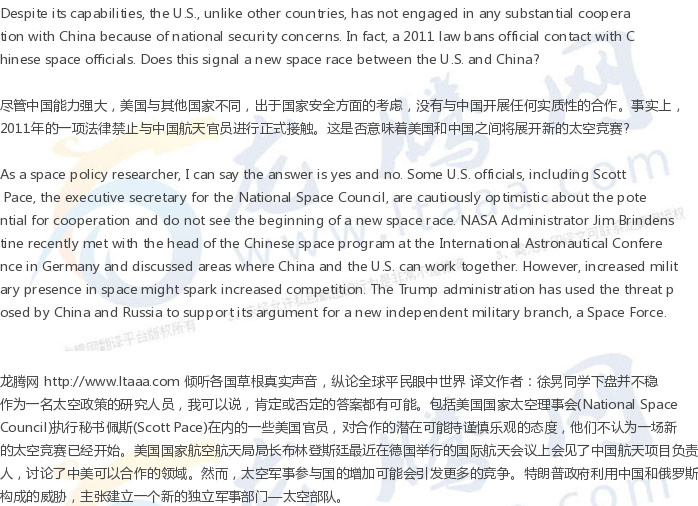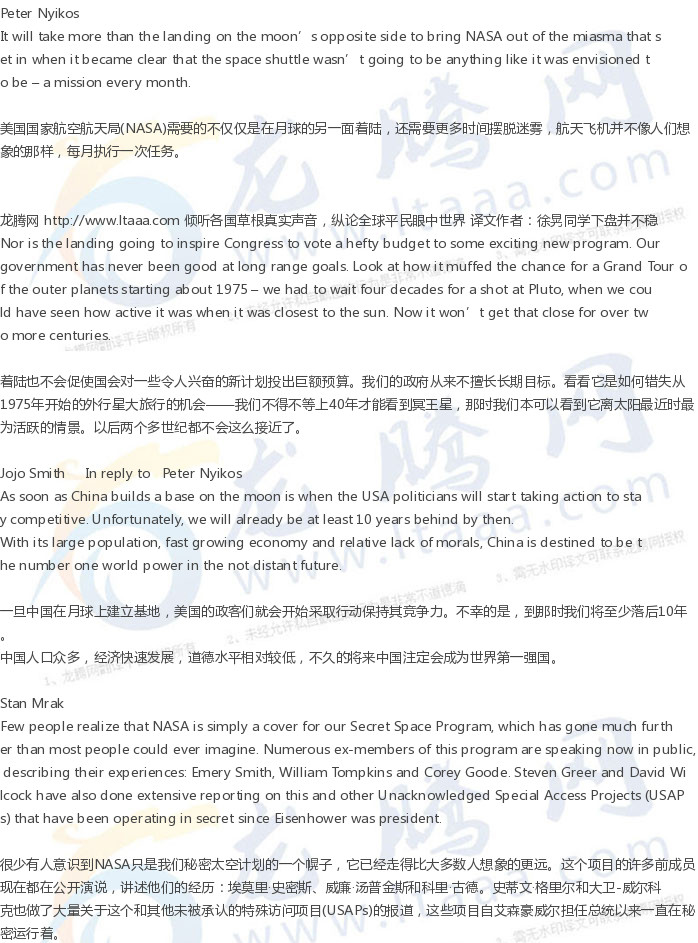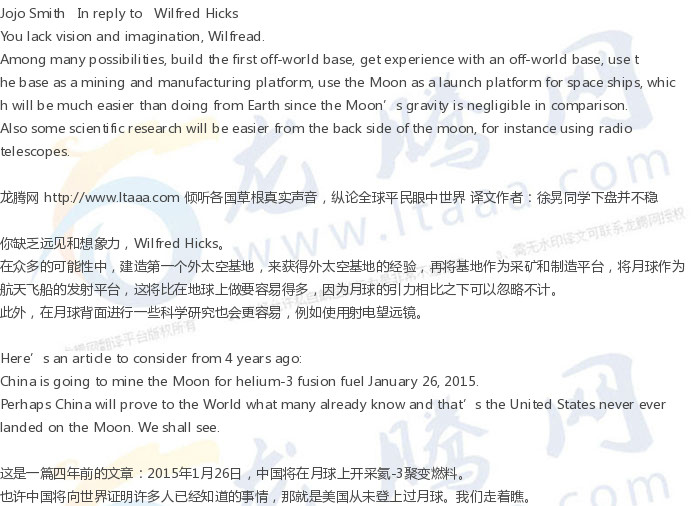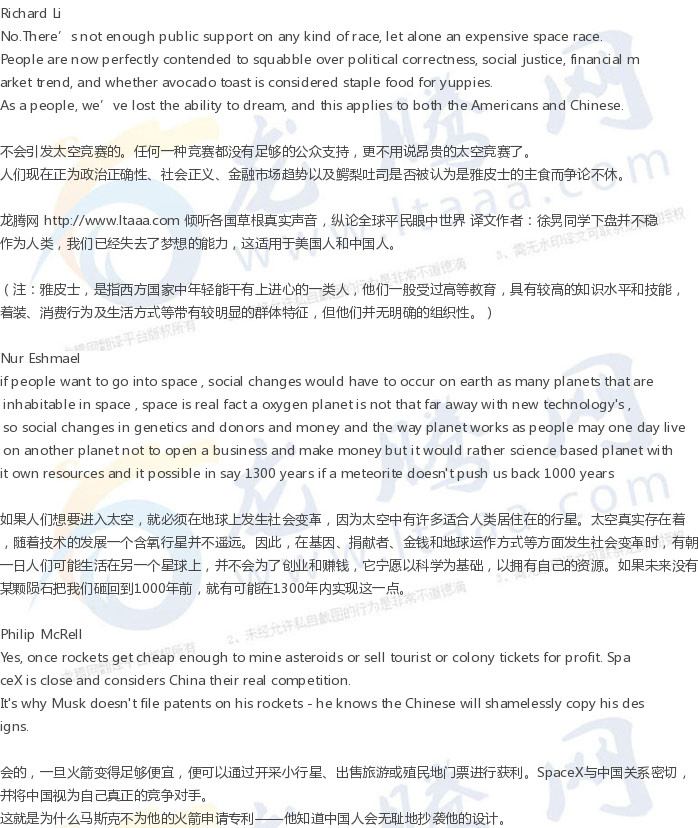中国登月是否会引发新的太空竞赛? [美国媒体]
2018年12月8日,中国在西昌卫星发射中心用长征三号乙运载火箭成功发射嫦娥四号探测器,开启了月球探测的新旅程。2019年1月3日,经过为期26天的环月轨道飞行后,嫦娥四号探测器顺利着陆月球南极—冯·卡门陨坑,代表全人类首次登陆造访月球背面,并开展月球巡视,这是一次伟大的落月之旅。
On December 8, 2018, China successfully launched Chang'e-4 probe with Long March No. 3 B carrier rocket at Xichang Satellite Launch Center, opening a new journey of lunar exploration. On January 3, 2019, after a 26-day orbital flight around the moon, Chang'e-4 successfully landed at the moon's Antarctic-Von Carmen crater, representing the first landing of all mankind on the back of the moon, and launched a lunar tour, which was a great trip to the moon.
2018年12月8日,中国在西昌卫星发射中心用长征三号乙运载火箭成功发射嫦娥四号探测器,开启了月球探测的新旅程。2019年1月3日,经过为期26天的环月轨道飞行后,嫦娥四号探测器顺利着陆月球南极—冯·卡门陨坑,代表全人类首次登陆造访月球背面,并开展月球巡视,这是一次伟大的落月之旅。
China became the third country to land a probe on the Moon on Jan. 3. But, more importantly, it became the first to do so on the far side of the moon, often called the dark side. The ability to land on the far side of the moon is a technical achievement in its own right, one that neither Russia nor the United States has pursued.
1月3日,中国成为世界上第三个将探测器送上月球的国家。但更重要的是,它第一次将探测器送到月球的远端,通常被称为黑暗的一面。能够在月球远端着陆本身就是一项技术成就,这点俄罗斯和美国都没有做到。
The probe, Chang’e 4, is symbolic of the growth of the Chinese space program and the capabilities it has amassed, significant for China and for relations among the great power across the world. The consequences extend to the United States as the Trump administration considers global competition in space as well as the future of space exploration.
嫦娥四号探测器象征着中国太空计划的发展及其能力的积累,对中国与世界大国之间的关系具有重要意义。随着特朗普政府考虑太空领域的全球竞争以及太空的未来探索,其影响将延伸到美国。
One of the major drivers of U.S. space policy historically has been competition with Russia particularly in the context of the Cold War. If China’s successes continue to accumulate, could the United States find itself engaged in a new space race?
历史上,美国太空政策的主要推动力之一是与俄罗斯的竞争,尤其是在冷战时期。如果中国的成功继续累积,美国是否会发现自己卷入了一场新的太空竞赛?
This does not mean the Chinese were not concerned about the global power space efforts can generate. In 1992, they concluded that having a space station would be a major sign and source of prestige in the 21st century. As such, a human spaceflight program was re-established leading to the development of the Shenzhou spacecraft. The first Chinese astronaut, or taikonaut, Yang Liwei, was launched in 2003. In total, six Shenzhou missions have carried 12 taikonauts into low earth orbit, including two to China’s first space station, Tiangong-1.
这并不意味着中国不关心太空探索所能产生的全球能源。1992年中国得出结论,拥有空间站将是21世纪一个重要标志和威望来源。因此,人类航天计划重新建立,促进了神州飞船的发展。2003年,中国第一位宇航员杨利伟随神州五号发射升空。总共有6次神舟飞行任务将12名宇航员送入近地轨道,其中包括两次进入中国第一个空间站——天宫一号。
In addition to human spaceflight, the Chinese have also undertaken scientific missions like Chang’e 4. Its first lunar mission, Chang’e 1, orbited the moon in October 2007 and a rover landed on the moon in 2013. China’s future plans include a new space station, a lunar base and possible sample return missions from Mars.
除了载人航天飞行,中国还承担了像嫦娥四号这样的科学任务。它的第一次探月任务是嫦娥一号于2007年10月绕月飞行,2013年一辆月球车登陆月球。中国未来的计划包括一个新的空间站,一个月球基地,以及可能从火星带回样本的任务。
A new space race?
The most notable feature of the Chinese space program, especially compared to the early American and Russian programs, is its slow and steady pace. Because of the secrecy that surrounds many aspects of the Chinese space program, its exact capabilities are unknown. However, the program is likely on par with its counterparts.
意味着一场新的太空竞赛吗?
中国航天计划最显着的特点,特别是与早期的美国和俄罗斯的计划相比,是其缓慢而稳定的步伐。由于中国太空计划的许多方面都是保密的,它的确切能力还不得而知。然而,该计划很可能与其他同类计划并驾齐驱。
In terms of military applications, China has also demonstrated significant skills. In 2007, it undertook an anti-satellite test, launching a ground-based missile to destroy a failed weather satellite. While successful, the test created a cloud of orbital debris that continues to threaten other satellites. The movie “Gravity” illustrated the dangers space debris poses to both satellites and humans. In its 2018 report on the Chinese military, the Department of Defense reported that China’s military space program “continues to mature rapidly.”
在军事应用方面,中国也展示了高超的技术。2007年,中国进行了一次反卫星测试,发射了一枚地面导弹摧毁一颗失灵的气象卫星。这次试验虽然成功,但产生了大量轨道碎片,继续威胁着其他卫星。电影《地心引力》展示了太空碎片对卫星和人类造成的危险。美国国防部在其2018年中国军事报告中称,中国的军事太空计划“继续迅速成熟”。
Regardless, China’s abilities in space are growing to the extent that is reflected in popular culture. In Andy Weir’s 2011 novel “The Martian” and its later film version, NASA turns to China to help rescue its stranded astronaut. While competition can lead to advances in technology, as the first space race demonstrated, a greater global capacity for space exploration can also be beneficial not only for saving stranded astronauts but increasing knowledge about the universe where we all live. Even if China’s rise heralds a new space race, not all consequences will be negative.
无论如何,中国的太空实力正在增长,这在流行文化中得到了体现。在安迪·韦尔(Andy Weir) 2011年的小说《火星救援》(The Martian)及其后来的电影版中,美国国家航空航天局(NASA)向中国求助,以营救其受困的宇航员。正如第一次太空竞赛所表明的那样,竞争可以导致技术的进步,更大的全球空间探索能力也可能不仅有利于拯救受困的宇航员,还有助于增进对我们生活的宇宙的了解。即使中国的崛起预示着一场新的太空竞赛,也不是所有的结果都是负面的。
Jojo Smith
Hopefully!Trump needs to get his Space Force in action, build warp enabled spaceships like the Enterprise and lead us to the stars! (Psst - someone whisper this in his ear).
希望如此!特朗普需要让他的太空部队投入行动,建造像“进取号”这样的曲速飞船,并带领我们走向星空!(嘘-有人在他耳边低声说)
(注:曲速飞船在四周时空通过曲率驱动,创造出曲速气泡,能够将时空距离缩短很多,从而进行星际旅行。这种方式并不违反相对论的说法,因为这是由曲速气泡所带动的,令身处时空中的飞船达到超越光速,但并未打破光速的限制。)
Jojo Smith In reply to Stan Mrak
Really? So what has this secret project accomplished? Are they going to unveil existing bases on the Moon and Mars? A working starship? Been mining asteroids for diamonds to pay off our national debt?
真的吗?那么这个秘密项目完成了什么?他们会公布现有的月球和火星基地吗?是一艘正在作业的飞船吗?那么开采小行星上的钻石是为了偿还国家债务?
Wilfred Hicks
What is China going to do on the far side of the moon?
Name it the South China Sea II , declare sovereignty for the PLA , & build a island with a Rail Gun?
A part from bragging rights ?
中国将在月球的另一端做什么呢?
要把它命名为南海二号来宣布中国人民解放军的主权,从而用轨道炮造一个岛屿吗?
还是说仅仅是自吹自擂?
Robert Davie
We need to reinvigorate science and technology in the West through a massive injection of funds into research and development in all fields of science, technology and digital innovation. We must also inject massive funds into science and mathematics education including in the field of coding so that we have the scientists and engineers we need in the future. China is currently graduating in excess of six million science and engineering graduates from its universities each year. That figure is also rising each year
我们要通过向科技、数字创新等各个领域的研发投入大量资金,重振西方科技。我们还必须向科学和数学教育,包括编码领域,注入大量资金,以便拥有我们未来需要的科学家和工程师。中国目前每年从大学毕业的理工科毕业生超过600万。这个数字也在逐年上升。
Sanket Shah
I think the race is already on. In 2007, the Chinese conducted a test that blew an old satellite they had launched. Read about it here . This sparked great concern in neighbors India, Japan & South Korea who have considerable number of satellites that run their respective countries. It also created a significant space debris issue which affects every single launch in that trajectory.
我想竞赛已经开始了。2007年,中国进行了一次试验,炸毁了他们发射的一颗旧卫星。这引起邻国印度、日本和韩国的高度关注,这些国家各自拥有相当数量的卫星。它还带来了重大的空间碎片问题,影响到这一轨道上的每一次发射。
Japan is technologically superior to the Chinese as JAXA has carried out much more complex missions. Chinese have advanced well in manned space exploration though. ISRO on the other hand has developed its own expertise in remote sensing. They did the
Chandrayaan mission to Moon and Mangalyaan to Mars. JAXA has done the Hayabusa mission which went to an asteroid, collected samples and came back to earth! The Chinese have recently landed a rover on the Moon.
So I'd say the race is already happening.
日本在技术上优于中国,因为日本宇宙航空研究开发机构(JAXA)执行的任务要复杂得多。尽管如此,中国在载人航天探索方面已经取得了很好的进展。另一方面,印度空间研究组织(ISRO)发展了自己在遥感方面的专门知识。他们完成了月球上的Chandrayaan任务和火星上的Mangalyaan任务。日本宇宙航空研究开发机构已经完成了Hayabusa任务,它去了一颗小行星收集样本,然后返回了地球!中国人最近在月球上登陆了一艘月球车。所以我得说太空竞赛已经开始了。
Rick Bruno
I really hope it does. Those were the good old days. We had missions that inspired us, heroes to cheer for, nobody got shot, and the sky was the limit. We made dreams of millenia come true. We lost that drive, somewhere.
Sadly, I do not think the inspiration to "race" the Chinese will happen unless there is a military or propaganda angle to it.
我真的希望是这样。那是过去的美好时光,我们有激励自己的任务,有值得欢呼的英雄,没有人会中枪,而天空就是极限。我们使千禧年的美梦成真。但却在某个地方失去了动力。
可悲的是,除非有军事行动或宣传发生,否则我认为不会激起中国人的“种族”灵感。
Daniel Cohort
Not likely. The only countries that are interested in a space race with China are India, Japan and South Korea, namely China's neighbors. The problem is China is the only country that could provide sufficient funding and continual support to its space program. Japan's claim about establishing a lunar base in 2015 is unlikely to materialize this year. Other countries' bluffs such as putting a man on the moon in 2020 or 2025 are also more optics than future realities.
不太可能。唯一对与中国进行太空竞赛感兴趣的国家是印度、日本和韩国,即中国的邻国。问题是中国是唯一一个能够为其太空计划提供足够资金和持续支持的国家。日本声称要在2015年建立月球基地,但今年不太可能实现。其他国家虚张声势,比如在2020年或2025年将人类送上月球,更多的是吹嘘,并不会在未来实现。
Robert Holmén
All the technology needed execute an autonomous landing of a spacecraft on the far side of the Moon has already been demonstrated for years by the United State’s numerous successful landing on Mars.
多年来,美国在火星上的多次成功着陆,已经证明了其在月球远端实现航天器自主着陆所需的所有技术。
Ray Nieves
No, but it is an important addition to the race faring nations as it brings China up to the current technology levels of Russia, ESA and the US.
In time we may be able to share projects and explorations with them as we did with the Russians….
不会,不过这是对竞争对手的一个重要补充,因为它使中国达到了俄罗斯、欧空局和美国目前的技术水平。随着时间的推移,我们可能会和中国一起分享项目和探索,就像我们和俄罗斯所做的那样……
版权声明
我们致力于传递世界各地老百姓最真实、最直接、最详尽的对中国的看法
【版权与免责声明】如发现内容存在版权问题,烦请提供相关信息发邮件,
我们将及时沟通与处理。本站内容除非来源注明五毛网,否则均为网友转载,涉及言论、版权与本站无关。
本文仅代表作者观点,不代表本站立场。
本文来自网络,如有侵权及时联系本网站。
图文文章RECOMMEND
热门文章HOT NEWS
-
1
Why do most people who have a positive view of China have been to ...
- 2
- 3
- 4
- 5
- 6
- 7
- 8
- 9
- 10
推荐文章HOT NEWS
-
1
Why do most people who have a positive view of China have been to ...
- 2
- 3
- 4
- 5
- 6
- 7
- 8
- 9
- 10
